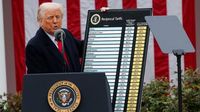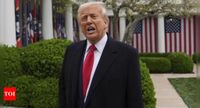US stocks tumbled in after-hours trading on April 2, 2025, following President Donald Trump’s announcement of sweeping tariffs during a speech at the Rose Garden. The Dow futures dropped 256 points, or 0.61%, while S&P 500 futures slid 1.69% and Nasdaq 100 futures fell by 2.54%. Exchange-traded funds (ETFs) tracking major stock indexes also experienced significant declines, with an ETF tracking the Dow down 1.1%, one for the S&P 500 down 2.2%, and an ETF for the Nasdaq 100 sliding 3%. This downturn in the stock market comes despite a previous rally before the tariff announcement.
In a surprising twist, gold prices surged as the most actively traded gold futures contract in New York briefly rose above $3,200 a troy ounce, marking a record high. Gold has seen an increase of more than 20% this year, posting its best quarterly performance since 1986. This rise in gold prices is attributed to its status as a safe haven amid ongoing economic and political uncertainties.
Trump’s announcement detailed a series of new import tariffs affecting various countries, with India facing a 26% tariff. Other countries are also significantly impacted, with tariffs set at 34% for China, 20% for the European Union, 46% for Vietnam, 32% for Taiwan, 24% for Japan, 10% for the United Kingdom, 37% for Bangladesh, 29% for Pakistan, 44% for Sri Lanka, and 17% for Israel. The President emphasized that these tariffs are part of a strategy to address long-standing trade imbalances and promote domestic manufacturing.
During his remarks at the 'Make America Wealthy Again' event, Trump stated, "The United States charges other countries only a 2.4 tariff on motorcycles. Meanwhile, Thailand and others are charging much higher prices like 60%, India charges 70%, Vietnam charges 75% and others are even higher than that." He further announced a 25% tariff on all foreign-made automobiles, effective immediately. Trump declared, "Such horrendous imbalances have devastated our industrial base and put our national security at risk. I don’t blame these other countries at all for this calamity. I blame former presidents and past leaders who weren’t doing their job…"
In a bold assertion, Trump claimed that the tariffs would mark a historic moment, stating, "This is one of the most important days, in my opinion, in American history. It is our Declaration of Economic Independence." He lamented that hardworking American citizens have been sidelined while other nations prospered at the United States' expense. Trump was adamant that the era of American taxpayers being "ripped off" was over.
However, Trump's announcement has not come without controversy. Economists have expressed concern that these tariffs could lead to increased consumer prices and disruptions in global supply chains. Goldman Sachs has raised the probability of a US recession to 35%, citing slowing growth and declining business confidence as significant factors. Critics argue that while the intent is to strengthen American industry, the potential fallout could be detrimental to consumers.
Egg prices have also been a topic of discussion during this time. Trump defended himself against criticism regarding high egg prices, claiming he had no role in the surge. He stated, "I just got here," and shifted the blame to his predecessors. Egg prices had reached a decade-high of $5.90 per dozen in February 2025 due to supply chain disruptions and avian flu outbreaks. However, prices have started to decline, with wholesale eggs now averaging $3.00 per dozen. The US Department of Agriculture noted that while shelf prices are slowly declining, consumers have yet to see significant relief.
Despite the decrease in egg prices, Trump took credit for recent price drops, highlighting his administration’s $1 billion investment in combating avian flu. However, industry experts attribute the decline in prices to the natural recovery of poultry farms and increased production. American Farm Bureau Federation economist Bernt Nelson remarked that the situation is improving due to better supply conditions.
In response to the impending tariffs, India has proposed significant concessions to the US, including reducing tariffs on various agricultural imports and eliminating import taxes on US liquefied natural gas (LNG). These measures aim to facilitate a trade deal and potentially avert the tariffs. Meanwhile, Canadian Prime Minister Mark Carney has expressed strong opposition to the US tariffs, emphasizing the importance of respecting Canada’s sovereignty and indicating a shift towards diversifying trade relationships.
Japanese Prime Minister Shigeru Ishiba has announced plans to actively seek an exemption from the new US auto tariffs, despite Japan’s close ties with the US. The European Union has prepared countermeasures, and other nations are considering similar actions. With the implementation of these tariffs, the situation remains fluid, and the potential for escalating trade tensions looms large.
As the global economic landscape shifts in response to these new tariffs, all eyes will be on the Asian markets when they open for trading. The ramifications of Trump’s tariffs may stretch far beyond the immediate stock market reactions, affecting international relations and global trade dynamics for years to come.






